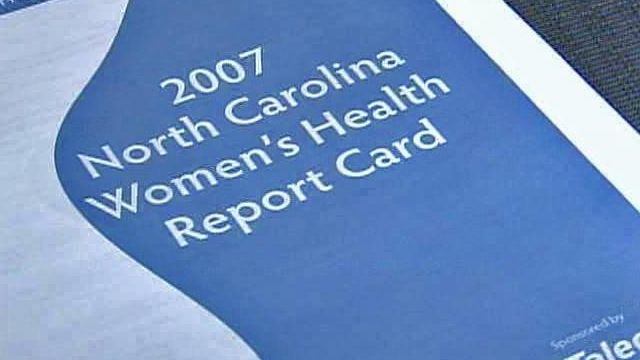Health Team
Report Card on N.C. Women's Health Released
The report revealed what improved, stayed the same or grew worse between 2001 and 2005. The Center for Women’s Health Research at UNC and state agencies gathered and interpreted the data.
Posted — UpdatedRALEIGH, N.C. — Health-care and legislative leaders recently unveiled the grades on the North Carolina Women’s Health report card.
The report revealed what improved, stayed the same or worsened between 2001 and 2005. The Center for Women’s Health Research at the University of North Carolina at Chapel Hill worked with state agencies to gather and interpret the data.
Among the findings:
- Between 2001 and 2005, 14 percent fewer women smoked, and fewer smoked during pregnancy
- Syphilis and gonorrhea rates have continued to decline
- More black and Hispanic women are getting D’s and F’s in several areas, compared with white women
- More than 16 percent of all North Carolina women have no health insurance and live below the poverty level
“We’re halfway home, but we have a long way to go,” said Lt. Gov. Beverly Perdue.
Another finding was that over four years, about 1 percent more Hispanic women received late or no prenatal care.
The infant mortality rate among black women increased slightly. North Carolina has the 11th-highest infant mortality rate in the nation. Social barriers might account for some of the health disparities, the report said.
All racial groups show improvement with reduced heart disease and stroke, scoring B's. Obesity increased 20 percent for white women and 11 percent for black women, however. High cholesterol also was up for all women, but more than doubled for Hispanic women
“More of us understand and are taking prevention seriously, because we’re getting more preventative screens for breast cancer, for uterine cancer, for colon cancer. Y’all, that’s super news,” Perdue said.
One of the more dramatic numbers in the report showed that 30 percent of all women had not visited a dentist within the past 12 months.
Legislators are in the midst of budget negotiations, so the timing of the report is no coincidence, according to WRAL Health Team Physician Dr. Allen Mask.
“Health-care leaders are hoping for more money in the budget to address these concerns, including making health care more accessible, health insurance more available and education efforts more effective,” he said.
• Credits
Copyright 2024 by Capitol Broadcasting Company. All rights reserved. This material may not be published, broadcast, rewritten or redistributed.





